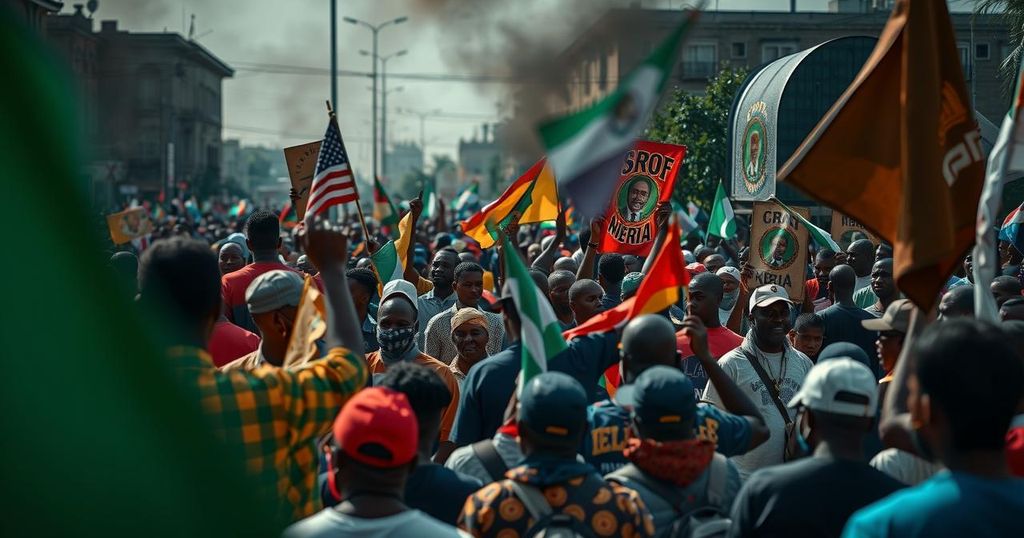Nationwide Protests Erupt in Nigeria Over Economic Hardship and Government Policies
Protests have erupted throughout Nigeria as citizens express their outrage over escalating food inflation and economic hardships. Demonstrators in cities like Abuja and Lagos are demanding changes to government policies deemed anti-poor, particularly those influenced by the World Bank. Despite a heavy police presence and recent crackdowns on dissent, protest leaders claim they will not be deterred as they seek to hold the government accountable for rising costs of living.
Nigerians have united in protests across various cities for the second time in two months to voice their grievances against the severe economic hardships plaguing the nation. Following decades of the highest food inflation rates, which has led to widespread hunger and business closures, the demonstrators gathered in places such as Abuja and Lagos to express their dissatisfaction with government policies that they deem anti-poor. Police in Abuja resorted to using tear gas against protesters chanting slogans like “no more hunger” and “end bad governance.” Juwon Sanyaolu, leader of the Take it Back movement, articulated the sentiment of the crowd, stating, “The ordinary people are suffering, but this government doesn’t care because they cannot feel the pulse of the ordinary people.” While organizers strategically aligned the protests with Nigeria’s 64th Independence Day—typically a time for celebration—many felt a stark absence of joy due to the pervasive economic crisis. Protesters are demanding an end to austerity measures recommended by the World Bank, a reduction in electricity prices, and the release of those arrested in previous demonstrations. As protesters gathered in significant numbers in Lagos despite the heavy police presence, Ilorin witnessed intimidation tactics by law enforcement, ultimately diminishing the turnout. Ahmad, a local point-of-sale (POS) operator, expressed reluctance to join the protests unless enough people were willing, reflecting the prevailing fear due to economic pressures. The drastic rise in food prices, with staples such as rice and garri becoming increasingly unaffordable, has exacerbated the plight of ordinary Nigerians. Under President Bola Ahmed Tinubu’s administration, economic measures—including the removal of a long-standing fuel subsidy—have led to a surge in inflation and a dramatic devaluation of the Nigerian naira. Despite some administrative responses, such as raising the minimum wage and securing international relief funding, many remain skeptical about the effectiveness of these measures in addressing the root causes of suffering amid current socio-economic challenges. Human rights groups have also raised alarms over the government’s severe crackdowns on dissent, recalling similar historical patterns of authoritarian governance in Nigeria. The protests signal a growing discontent among the populace, with demonstrators pledging to persist in their calls for change until their demands are met. As expressed by Sanyaolu, “We are not scared by them and we want our demands met unconditionally.” This sentiment reflects a determination among Nigerians to seek accountability and relief amid formidable economic hardships.
In recent months, Nigeria has experienced an unprecedented surge in food inflation, resulting in severe economic distress for its citizens. Societal frustration has culminated in protests across the nation, where demonstrators seek to address the government’s perceived indifference to their suffering. As living costs soar, many citizens have found it increasingly challenging to afford basic necessities. In particular, recent fiscal measures implemented by the government, aligning with World Bank recommendations, have aggravated the situation. The removal of long-standing fuel subsidies and subsequent increases in fuel prices have further strained the economy, leading to widespread discontent. Historical patterns of governmental repression against protestors raise concerns about human rights violations, adding to the complexity of the current socio-political climate in Nigeria.
The ongoing protests in Nigeria highlight a critical junction in the nation’s socio-economic landscape, where citizens grapple with the realities of extreme inflation and government policies perceived as neglectful. As demonstrators assert their right to dissent and demand accountability, the events underscore ongoing tensions between the populace and the state. Continuous unrest signals the need for substantial policy reform to alleviate hardship and restore faith among citizens in governmental institutions. Unless effective measures are implemented, the potential for further unrest remains high, emphasizing the urgency for dialogue and response from the leadership.
Original Source: www.aljazeera.com




Post Comment